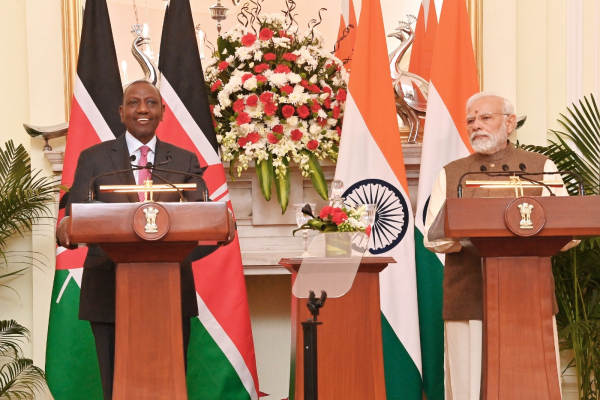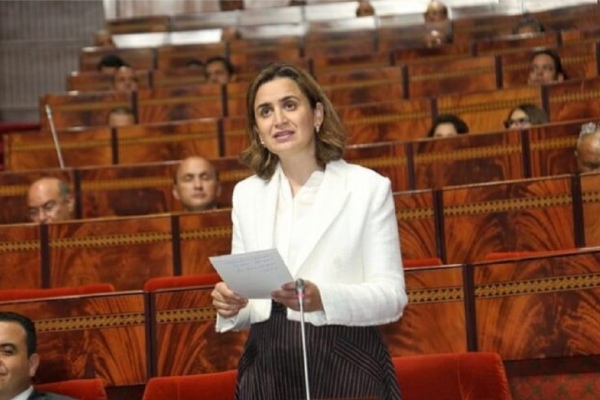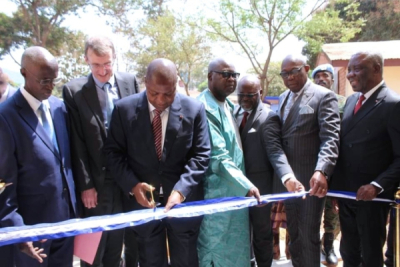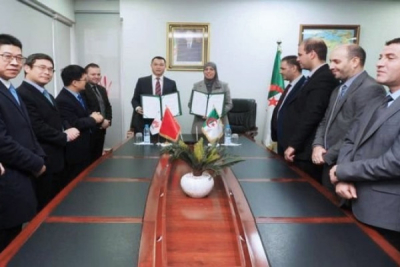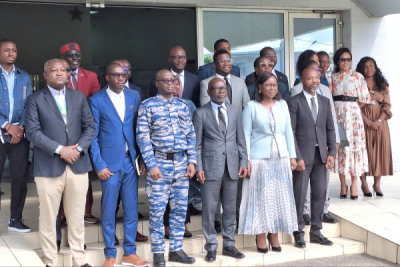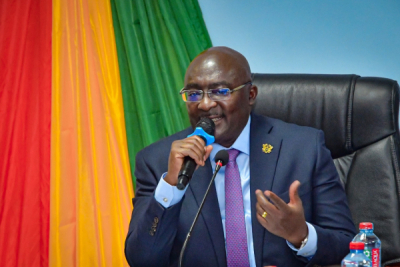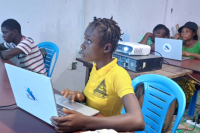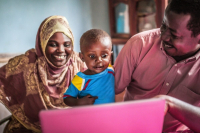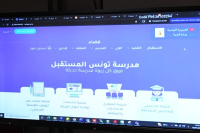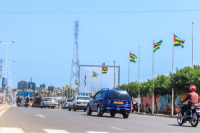
Public Management (598)
Last December, William Ruto paid a three-day visit to India. Several partnerships were forged between the two countries, including one in the technology sector.
The Indian government has approved a Memorandum of Understanding (MoU) with Kenya, aimed at sharing digital solutions for large-scale digital transformation, according to a statement released on Thursday. The MoU, which was signed on December 5, will be effective for three years from the date of signature.
The agreement seeks to foster closer cooperation and exchange of digital technology-based experiences and solutions to drive digital transformation initiatives in both nations.
Kenyan President William Ruto (photo, left), who visited India in December, signed several MoUs, including the one approved, with the Indian government led by Prime Minister Narendra Modi (photo, right). Ruto is keen on leveraging the digital sector as the driving force of Kenya's economy and is actively seeking partnerships to this end.
Kenya, with its mature technological ecosystem, is a major attraction for investors on the continent. A report by CB Insights, published last January 4, projected that Kenyan start-ups would have raised approximately $228 million by 2023.
It's worth noting that several African nations, including Sierra Leone, Gabon, Mauritius, and Nigeria, have sought India's technological expertise and have entered into partnerships with the country.
Adoni Conrad Quenum
Morocco has stepped up efforts to modernize its government services through digitalization, launching several initiatives aimed at increasing service efficiency and promoting citizen participation through online channels.
Morocco has digitized over 600 public services, with a focus on improving access for citizens and businesses, Digital Transition and Administrative Reform Minister Ghita Mezzour (photo) announced on Monday.
Of the digitized services, 300 are dedicated to citizens, 200 to businesses, and 100 to public administrations, Mezzour told the House of Representatives. She emphasized the government's commitment to completing ongoing digital projects encompassing public service management, administrative reform, online content regulation, and support for emerging businesses, all part of the national digital strategy.
Morocco's new digital strategy, "Maroc Digital 2030," currently undergoing approval, is built on two pillars: complete digitization of public services and stimulating the digital economy. It aims to create 300,000 jobs and contribute $17 billion (170 billion dirhams) to GDP by 2030.
To achieve these goals, the strategy proposes a range of initiatives, including labeling 3,000 startups, a significant increase from the 380 registered in 2022 ; qualifying 45,000 digital talents annually ; retraining 50,000 young people in digital professions and attracting 6,000 foreign digital talents each year.
With full service digitization, Morocco aims to climb from its current 113th position to the top 50 in the UN e-governance rankings. The country aspires to be a major player in the digital economy, driving job creation, economic growth, and improving citizens' lives through accessible and innovative public services.
Samira Njoya
While the digital economy booms elsewhere, the Central African Republic (CAR) faces a persistent challenge in bridging its own digital divide. Yet, amidst ongoing national struggles, the government is actively taking steps to equip young people with the digital skills they need to thrive in the global job market.
In a significant push towards a digital future, President Faustin Archange Touadéra of the Central African Republic (CAR) inaugurated a state-of-the-art digital training center and incubator at the University of Bangui on Monday, January 15. This launch coincided with the official nationwide rollout of broadband internet for the first time in the country.
Financed jointly by the European Union and the African Development Bank (ADB), the center aims to equip young people with the skills and tools to drive the creation of jobs and economic diversification through the burgeoning digital sector.
"This center marks a new chapter for fiber optic development in the Central African Republic. Its completion paves the way for high-speed internet access and positions CAR to become a smart nation, recognizing that internet access is a cornerstone of national development," stated the Prime Minister’s office.
The initiative forms part of CAR's national fiber optic backbone project, a key component of the broader Central African Backbone (CAB) program. Alongside the training center, the project encompasses a cybersecurity and electronic certification platform as well as technical assistance for the Ministry of Digital Economy, Posts and Telecommunications in establishing the Central African Digital Development Agency, which will spearhead the nation's digital strategy implementation.
The new center boasts cutting-edge equipment, including a training room, technical facilities, offices, an incubator, a database processing lab, and more. This infrastructure will empower young Central Africans to design, develop, and market digital products addressing the population's needs.
Samira Njoya
Algeria's digital transformation gained momentum in 2023, with the government implementing several programs. For the new year, the country prioritizes e-governance initiatives.
Algeria's state-run Haut-Commissariat à la Numérisation (HCN), the agency leading the nation's digital transformation, signed a memorandum of understanding (MoU) with Huawei Telecommunications' Algerian subsidiary on January 10.
The agreement, signed by HCN High Commissioner Meriem Benmouloud and Huawei Algeria's Chairman and CEO Eason Yi, aims to boost cooperation in key areas including experience exchange, training, and skills development as well as strategic support.
It sets the stage for collaborative knowledge sharing and best practices in the field of digital transformation while providing the framework for both parties to focus on equipping Algerian professionals with the necessary skills to drive the country's digital agenda. Also, in its framework, Huawei will contribute its expertise to the development of Algeria's 2024-2029 national digital transformation strategy, currently spearheaded by the HCN.
This partnership aligns with the HCN's mission of overseeing and guiding Algeria's digital transition. Established just months ago, the agency is tasked with managing strategic projects like the upcoming draft bill on digitization, slated for completion in the first quarter of 2024.
Samira Njoya
The 34th Africa Cup of Nations, Africa's premier soccer event, is scheduled to run from Saturday, January 13 to Sunday, February 11. Authorities in Côte d’Ivoire are implementing various measures to ensure the smooth execution of the tournament.
Last week, Côte d'Ivoire’s telecom regulator ARTCI and the country’s Computer Emergency Response Team (CI-CERT) launched "CyberCan 2023," a comprehensive cybersecurity plan safeguarding the ongoing Africa Cup of Nations (AFCON). Scheduled for January 13 to February 11, the tournament is expected to draw millions of visitors and generate significant online activity, prompting Ivorian authorities to prioritize digital security.
"CyberCan 2023" aims to protect sensitive networks and information systems related to the AFCON, along with the personal data of participants, supporters, and organizers. This includes securing critical infrastructure, implementing robust incident response protocols, and raising cybersecurity awareness among stakeholders.
With the continent's digital landscape expanding, the prominence of the AFCON amplifies the need for robust cybersecurity measures. According to the Global Cybersecurity Index 2020, Côte d'Ivoire ranks 11th in Africa, highlighting the potential vulnerabilities in a rapidly evolving digital landscape.
"Organizing major events like the AFCON presents significant challenges, and cybersecurity is one of the most pressing," acknowledged Namahoua Touré, ARTCI's director general. "In today's digital age, securing our national cyberspace is crucial, particularly during a tournament attracting global attention."
Adoni Conrad Quenum
In recent years, Ghana has embarked on a series of digitization efforts aimed at tackling corruption, safeguarding tax revenues, and enhancing living standards. The initial outcomes of these initiatives are now becoming increasingly evident.
Ghana's Vice President, Mahamudu Bawumia (photo), is advocating for continued government investment in digital technology. At the University of Ghana's 75th Annual New Year School and Conference, themed "Nurturing Resilience: Adopting Technology and Embracing Humanism for Sustainable Development," Bawumia highlighted the significant impact of digitization on the country's development following seven years of government investment in the sector.
Since 2017, Ghana's digitization efforts have resulted in the successful implementation of a national biometric identification system, a property address system, mobile money interoperability across all telephone networks and financial institutions, and the digitization of government services, passport offices, National Health Insurance Scheme (NHIS) services, port operations, and drone delivery of essential medicines, among others.
"The goal, upon assumption of office, was to quickly transform our economy by leveraging technological innovation as a means to leapfrog the development process, overcome legacy problems, and improve both economic and public sector governance. This is why digitalization has been a major area of focus for our government; to build a new system through digital transformation," he stated.
In Ghana, the decision to digitize services aims to minimize human contact as much as possible, combat corruption, and increase public revenue. For instance, the passport office processed a total of 16,232 applications in 2017, generating a turnover of 1.1 million cedis ($91,865). With digitization, the same office processed 498,963 online applications in 2021, generating a turnover of 56.7 million cedis.
The digitization of the driving license department in 2019 led to an increase of over 100% in service demand in 2020. The positive impact of digitization is also evident in the implementation of the motor insurance database, which shows growth in the insurance sector from 19% in 2019 to 37% in 2020 and 26% in 2021.
Samira Njoya
As digital proficiency becomes increasingly vital across multiple sectors, pressure is mounting on governments to bridge the skills gap and equip citizens with the tools to thrive in the digital age.
In a bid to bridge the digital gap and equip young Liberians with the tools to succeed in the 21st century, local IT company 231Data launched a free digital transformation training program on January 2nd.
"Our objective is to narrow the digital divide in Liberia by providing a significant segment of the population, particularly women and youth, with fundamental digital skills," said Niahson Porte, CEO of 231Data, at the program's inauguration in Paynesville.
The month-long initiative, backed by the Liberia Telecommunications Authority (LTA), aligns with the goals of the World Summit on the Information Society (WSIS), a global platform addressing the challenges and opportunities of the digital age.
The program targets Liberians aged 11 to 35, focusing on demographics often left behind in the digital revolution. Starting with an initial 60 trainees in Paynesville, the program aims to reach 10,000 across the country over the next two years.
Each session comprises two hours of training per day for two weeks, with 15 participants per group to ensure personalized attention. The curriculum covers essential skills like computer literacy, internet navigation, and basic software applications.
The program's ambitions go beyond technical proficiency. It seeks to empower individuals and communities to access education and information online, bridge the digital divide, and contribute to Liberia's economic development.
Samira Njoya
In 2021, Gabon launched a three-year acceleration plan to transform its economy. To carry out its projects, the country is receiving support from key partners such as the World Bank.
The government of Gabon and the World Bank have signed a $68.5 million loan agreement to fund the country's digital transformation project, "Gabon numérique", according to a press release issued by the financial institution on Tuesday, January 2.
The funding aims to accelerate the adoption of digitized public services, increase the number of people with a unique identifier, and strengthen data protection, cybersecurity, and secure data exchanges within the public sector.
"Digital transformation has been at the center of the country’s economic and social transformation for the past decade. This is critical to promote opportunities for all Gabonese citizens and residents. It will benefit individuals and businesses by improving the affordability, availability, and quality of public service delivery," said Cheick Kante, World Bank Country Director for Gabon.
The loan agreement comes as the country is accelerating its digital transformation projects. In July, an agreement was signed with the Indian group Shapporji-Pallonji for the construction of a national data center. Other projects, such as the digitization of the healthcare system, education, civil registration, and numerous citizen services, are currently underway in the country.
The World Bank's support is expected to back the implementation of these projects, address persistent inequalities in accessing public services, and contribute to the provision of a single identity for all citizens to facilitate their access to public services, including social protection, health insurance, and public procurement.
Samira Njoya
Schools everywhere had to close for COVID-19, so teaching online became super important, like a must-do. But just throwing kids online isn't enough. Schools need new tools and new ways of teaching to make sure students learn what they need in a world that's always changing.
To modernize education and enhance transparency, the Tunisian Ministry of Education on Wednesday launched "L’école de la Tunisie du futur," a comprehensive digital platform for students, parents, and teachers.
Accessible at http://www.tarbia.tn./fr, the platform provides dedicated portals for each group, streamlining administrative processes, facilitating distance learning, and offering real-time student monitoring. Parents can track attendance, assignments, and progress reports, while educators can manage classes and engage with students remotely.
This digital initiative dovetails with the Ministry's broader strategy of integrating technology into schools and closing the digital divide. The “Modern School on Every Hill" project aims to connect 3,300 schools to broadband internet by the end of the year, bridging the connectivity gap in rural areas.
According to Minister of Education Mohamed Ali Boughdiri, with the digital transition being crucial to improving education quality, the platform not only promotes transparency and efficiency but also streamlines essential services such as school meals, scholarships, and guidance.
Samira Njoya
In a bid to enhance transparency, efficiency, and combat corruption, Togo has embarked on an ambitious digital transformation journey, focusing on key sectors like taxation. Following the lead of several African nations, the West African country aims to leverage technology to streamline administrative processes and improve resource traceability.
Togolese drivers can now ditch the queues and pay their motor vehicle tax (TVM) from the comfort of their smartphones, marking a new chapter in the country's digital tax revolution.
The Togolese Revenue Office (OTR) launched the online payment system on Tuesday, January 2, following its December announcement. The move streamlines tax compliance for vehicle owners, eliminating the need for time-consuming visits to physical offices. It also contributes to improving the level of tax collection and ensures greater transparency in operations.
The online TVM payment is part of a broader digitization push by the OTR to modernize tax administration and boost revenue. Several other services, including tax identification (NIF) acquisition, have already gone digital. Through the nif.otr.tg platform, Togolese citizens can now obtain their NIF, pay taxes and fees, register real estate, and access other services, all from their mobile phones.
According to recently published OTR figures, tax revenues have doubled in the past decade, soaring from XOF403 billion (around $673 million) in 2013 to XOF865 billion in 2022.
Samira Njoya
More...
Algeria's ambitious drive to digitize its economy is starting to bear fruit, with key sectors experiencing tangible benefits from the government's focus on technological advancements.
Algeria is fast-tracking its journey towards a fully digitized government, with President Abdelmadjid Tebboune announcing the ambitious goal of "total dematerialization" of public services by mid-2024. The ambitious digital overhaul aims to simplify citizen interactions, streamline administrative processes, and reduce reliance on physical services.
In a landmark address to parliament on December 25, Tebboune outlined significant progress in digitizing key sectors, including national land registry, taxes, customs, healthcare, and digital identity. He declared, "By the end of 2024's first half, we will have definitively settled this question."
The push for digital transformation has gained momentum throughout 2023. Under Tebboune's directive, several initiatives have modernized crucial areas like education, where over 46 digital platforms for training and research were launched by the Ministry of Higher Education. Similarly, the labor, employment, and social security sector has seen numerous online platforms introduced, aiming to expedite service delivery and reduce the need for physical visits.
To spearhead these efforts, a High Commission for Digitization, led by Meriem Benmouloud, was established in September. This body is tasked with crafting the national digitization strategy and ensuring its effective implementation. Benmouloud confirmed that the strategy, currently under development, will be further bolstered by a dedicated law on digitization expected in the first quarter of 2024.
Samira Njoya
As Algeria embarks on a path of economic modernization, the North African nation is intensifying efforts to cultivate a vibrant ecosystem for innovative startups. This drive is poised to witness the proliferation of projects tackling social challenges with innovative technological solutions.
In a bid to fuel its fledgling startup ecosystem, Algeria has launched a dedicated crowdfunding platform, tapping into a global trend gaining traction.
The platform, launched on the sidelines of the first annual forum of the Algerian Securities Market Commission (COSOB), aims to bridge the gap between financial backers and aspiring entrepreneurs.
"This opens new doors for startups to access funding, broadening their options," said Yacine El-Mahdi Oualid (photo), Algeria's Minister of the Knowledge Economy, Startups, and Micro-enterprises.
The initiative dovetails with the government's broader thrust to expand financing avenues for innovative ventures. In October, a decree paved the way for crowdfunding activity in the country.
The platform is expected to empower companies with socially impactful projects to tap into a wider pool of investors through the digital platform.
Algeria is catching up with a rapidly surging global trend. Worldwide crowdfunding transactions ballooned from $1.5 billion in 2011 to $140 billion in 2022, with China leading the pack with a market size of $60-$100 billion. Africa, according to the World Bank, could see its crowdfunding market reach $2.5 billion by 2025.
Samira Njoya
As part of its digital transformation process, the Ethiopian government is investing in digital identification. The new project in that line is an e-passport initiative.
On Wednesday, December 13, the Ethiopian Immigration and Citizenship Services (ICS) and Toppan Gravity Ethiopia –a joint venture between Ethiopian Investment Holdings, Toppan Group, Berhanena Selam Printing Enterprise, and Educational Materials Production and Distribution Enterprise– officially signed a supply and services agreement to begin work on the new Ethiopian e-passport. The aim is to provide the country with a new, more secure travel document.
"This partnership marks a significant stride in modernizing Ethiopia's passport system, offering enhanced security features and improved efficiency," reads a tweet by the Immigration and Citizenship Services.
In recent years, Ethiopia has implemented several digital projects aimed at improving population identification. For instance, it set up the Fayda, a World Bank-supported program aimed at registering 90 million people by 2025. A similar program has also been set up to provide digital identification for 90,000 refugees and returnees on Ethiopian soil.
In a country that is immense in size and torn by internal conflicts between various ethnic groups, the introduction of the e-passport should significantly reduce the risk of identity forgery and fraud, thanks to additional levels of identity verification.
Adoni Conrad Quenum
According to the World Bank, the digital economy could generate more than $5.5 billion for Côte d'Ivoire by 2025, and more than $20 billion by 2050. However, seizing this golden opportunity requires immediate investment in critical infrastructure and initiatives.
Ibrahim Kalil Konaté (photo, center), Ivorian Minister for Digital Transition and Digitization, launched the construction of the next national data center in Abidjan on Thursday, December 14, in the presence of Jessica Davis Ba (photo, left), US Ambassador to Côte d'Ivoire. Certified Tier 3, the 2,200-terabit infrastructure will be built on a 20,000-square-meter site at the headquarters of the Radio Frequency Management Agency (AIGF) in Marcory-Anoumabo. The construction budget is $60 million.
"The National Data Center symbolizes our quest for digital sovereignty. It is designed to stimulate the dematerialization of administrative procedures, thus serving to modernize our public administration. As a catalyst for innovation, this Data Center will not only host the data of national administrative entities but also offer disaster recovery and business continuity solutions, thereby strengthening the resilience and security of our information systems," said the Minister.
The project aligns with the national digital development strategy, which was formally adopted in 2021. This comprehensive strategy, announced by Amadou Coulibaly, the then Minister for the Digital Economy, in June 2022, encompasses not only the construction of vital facilities but also the ambitious deployment of 7,000 kilometers of fiber optics by 2025.
Data centers are key to the ongoing digital transformation. African countries therefore need to invest in these infrastructures especially since the continent hosts only 2% of the global data centers, according to the International Telecommunication Union.
Adoni Conrad Quenum


